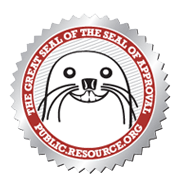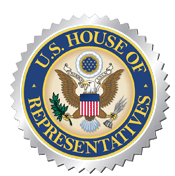VIA EMAIL
National Cable Satellite Corp. DBA "C-SPAN"
404 N. Capitol Street, N.W.
Washington, D.C. 20001
Dear Mr. Lamb:
In discussing the issue of Speaker Nancy Pelosi placing a minute of footage from a congressional hearing on her blog and why this prompted C-SPAN to issue a "take down" notice to the Speaker, Bruce Collins, the General Counsel of C-SPAN, told the New York Times:
“What I think a lot of people don’t understand — C-Span is a business, just like CNN is. If we don’t have a revenue stream, we wouldn’t have six crews ready to cover Congressional hearings.”
There is something else that people don't understand, and that is that C-SPAN is a nonprofit business that has been paid handsomely for providing a valuable public service. According to Guidestar, C-SPAN, doing business as the National Cable Satellite Corporation, had revenues for the year ending March 31, 2005 of $52,437,531 and expenses of only $48,858,668. In other years, the excess of revenue over expense has been even greater. Indeed, C-SPAN had stashed away $93,886,282 in total assets, a large part of which is in cash and securities. (Form 990). In addition, the C-SPAN Educational Foundation had net assets of $2,591,238 on March 31, 2005 (Form 990).
What people also may not understand is that C-SPAN is the primary beneficiary of considerable public largess. The House-Senate Radio-Television gallery, along with all the individual committees, go to great lengths and expense to accommodate and support C-SPAN. The Congress wisely does not break these expenses out as line items in their Legislative Branch Appropriations Bill, but to underscore the scale of the commitment, I would call your attention to the comments of the Honorable David Obey in House Report 109-139:
The cost of the Capitol Visitor Center, first estimated at $95 million, has ballooned to over $500 million. I have raised my concerns about this project several times in the past, and I continue to have serious objections to the current plan. ... For example, the CVC will provide the House with little, if any, usable new workspace. ... The current design of the CVC House space includes 87,000-square feet of space, of which only 3,200 square feet is for hearing rooms where public business can be conducted, and even this is designed inefficiently. This is because the real work of the Congress was not a primary consideration in its construction. It was constructed in such a way as to make it ready for television. The media room takes up two floors, wasting significant space, with limited room for staff or the public. The chief value of this opulent hearing space, and the accompanying new Radio and Television Gallery , seems to be as a high tech propaganda tool.
In addition to a large part of the $500 million visitor center being an accommodation to organizations like C-SPAN, I can speak from first-hand experience when I say there is also a huge investment by the Congress in terms of equipment rooms, wiring, and other facilities that make your work possible. A dozen public servants who staff the galleries and work for the U.S. Congress do nothing but help organizations such as yours.
This very significant public subsidy of your work makes the issue of copyright somewhat questionable. But, I write today to you on a matter of conscience, not a matter of the law. If C-SPAN were Disney, I might understand (though I would not sympathize with) a desire to milk an asset for every penny allowable by law. But, C-SPAN is not Disney and you should not treat the U.S. Congress like Disney would treat Mickey Mouse.
C-SPAN is a publicly-supported charity. Your only shareholders are the American public. Your donors received considerable tax relief in making donations to you. You and your staff were well paid for your excellent work. Congressional hearings are of strikingly important public value, and aggressive moves to prevent any fair use of the material is double-dipping on your part. For C-SPAN and for the American public record, the right thing to do is to release all of that material back into the public domain where it belongs.
I thus write to you today with a specific request and a notice:
- Your inventory shows 6,251 videos of congressional hearings for sale in the C-SPAN store at an average price of $169.50, for a total retail value of approximately $1,059,544. I am offering today to purchase this collection of discs from you for the purpose of ripping and posting on the Internet in a nonproprietary format for reuse by anybody. I understand your store would take a while to process such an order and am willing to place it in stages.
- I have purchased Disc 192720-1 from the C-SPAN store, ripped more than one minute of video from the disc, and used it for the creation of a news and satirical commentary of compelling public interest and then posted the resulting work at the Internet Archive. I did not ask C-SPAN for a license and I assert fair use of this material.
Mr. Lamb, C-SPAN has been a pioneer in promoting a more open government. You created a grand bargain with the Cable Industry and the U.S. Congress. When I created the first radio station on the Internet and was asked why I did so as a non-profit instead of going for the gold like many of my colleagues, my reply has always been that I was inspired by your example.
Your grand bargain has served the American people and the C-SPAN organization well. Holding congressional hearings hostage is not in keeping with your charter, and it is not in keeping with the spirit of that grand bargain you made with the American people. Please re-release this material back into the public domain where it came from so that it will continue to make our public civic life richer.
Sincerely yours,
Carl Malamud
CC:
Rob Kennedy, Chief Operating Officer, C-SPAN (RKENNEDY@c-span.org)

